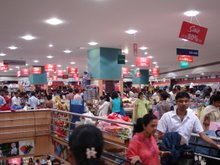Retail boom fuels growth in logistics sector
India's retail sector opens up on a huge scale, domestic logistics companies are planning significant investments to expand their portfolio of services. It is expected that in the next two years, the logistics sector will have undergone major changes, offering a wide spectrum of services. Consider this: Global retail giant Wal Mart announces its entry into India through a joint venture with Bharti. Reliance puts on its drawing board a mega plan of Rs 25,000-crore to create 100 million sq ft of retail space. The Aditya Birla group makes a retail foray with plans to invest Rs 15,000 crore. The Tatas plan to participate in the retail race with renewed vigour. Pantaloon plans to create a retail space of 30 million sq ft by 2009-10. Shoppers Stop may have 6 million sq ft of retail space by the same time. Global retailers from the US, European Union and Australia are all eyeing the retail revolution in India.
On the growth path
Indian players in the logistics space are keenly tracking these developments, as they suddenly find their services in big demand. Although some retailers, like Reliance, may have their own logistics subsidiaries, most of the others are working with third-party providers. "The Indian logistics sector is at the beginning of a strong growth path. Not only retail, there are other growth drivers like the manufacturing, FMCG and auto components sectors," says an Edelweiss research. Players in the segment are, indeed, ramping up their capital expenditure programme. Edelweiss estimates that the six major players in this sector — Concor, Gateway Distriparks Ltd (GDL), Allcargo, SICAL, Transport Corporation of India and Gati — will spend Rs 3,400 crore over the next three years to cash in on the growth opportunities. These companies together invested about Rs 500 crore in the last fiscal. The companies plan to expand their service portfolios. For example, Concor and SICAL's future growth area is cold chain logistics, GDL and SICAL's is container train operations, while TCI and Gati's is warehousing. Other trucking and courier companies are leveraging on their networks to offer express and supply chain distribution solutions, apart from developing expertise in 3PL (third-party logistics) services.
Absorbing investments
The different sectors within the logistics segment are also poised to absorb significant investments. Edelweiss estimates that the container train sector (thrown open to private sector recently) will see a capex of Rs 1,600 crore in the next three years, while warehousing will get Rs 200 crore, trucking/XPS Rs 380 crore and offshore logistics Rs 250 crore. Worldwide, the logistics industry is on a growth path, with the global logistics industry estimated to be of the size of $3.5 trillion in 2005 — the US market alone was estimated at $900 billion, almost 25 per cent of the global industry. In fact, about 60 per cent of the Fortune 500 companies report having at least one contract with a 3PL company. "India at present spends 13 per cent of its GDP on logistics, which is much higher than the global average. We believe that this is due to inadequate infrastructure leading to periodic bottlenecks along the routes. Another major reason is the regulatory loopholes, which raise the cost of service and cause delays," the Edelweiss research points out. However, the infrastructure will certainly see brisk development in the coming years, with the Government attaching high priority to this sector. The road sector alone will see investments of about Rs 1,52,000 crore between 2006 and 2012. Airports, which together handled a cargo of 1.4 million tonnes last fiscal, as against 0.65 million in 1995-96, will also see significant expansion and development.
The biggest challenge
The logistics companies at present provide services from transportation to warehousing and inventory management. But, in the near future, they will have to expand their products basket to include new value-added services, such as packaging, labelling and reverse logistics.
The biggest challenge that faces these companies is that they should quickly imbibe latest technologies, such as GPC/GIS tracking of consignments, and uncork new services to cater to corporates seeking to outsource their logistics needs. Also, the Government should come out with a sound policy that facilitates the operations of the logistics companies.
Courtesy: Business Standard
For more detail on Retail India visit: http://www.retailindia.tv/


No comments:
Post a Comment